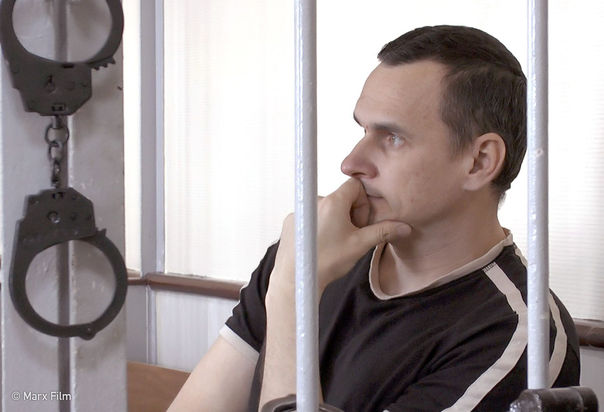Political repression lies in people getting scared of a story
By Rowan El Shimi

Film still from THE TRIAL: THE STATE OF RUSSIA VS. OLEG SENTSOV
2034. This is the year Ukrainian filmmaker Oleg Sentsov is scheduled to be released from Russian prison on charges of plotting terrorist acts. Throughout the 75-minute-documentary THE TRIAL: THE STATE OF RUSSIA VS. OLEG SENTSOV he appears in a small cage in the courtroom mirroring the Kafkaesque absurdity of the trial itself.
Director Askold Kurov, who has several politically charged documentaries under his belt, chronicles the 2014 trial of Sentsov. However, THE TRIAL is not an artistic masterpiece and is more like an extended news report with no real narrative arc. It is an important alternative document to the state narrative which sensationalise these types of trials to spread fear of dissent and advance compliance.
Kidnapped from his house in Russian-annexed Crimea on charges based on testimonies that appear to be taken from defendants under torture, Sentsov is accused of plotting to bomb the Lenin monument and Russian public offices. The film argues that Sentsov's activism is the reason for his imprisonment. He took part in the AutoMaidan protests, was helping Ukranian soldiers during Russia's annexation of Crimea and is a vocal critic of the Russian regime. The film weaves archival footage of Sentsov's television appearances as a film director, scenes from his trials effects on his family, the activism by the film community for his release and the progression of the trial itself – with a lot of talking heads explaining the trial's proceedings and the larger political context in Ukraine and Russia.
Presented in the Berlinale Special by the European Film Academy, audience members were asked to hold up yellow “Free Oleg Sentsov” papers as part of a wider campaign for Sentsov's release further demonstrating that the film's relevance lies in its political content. “The Academy had to take this position and help him as a sign of solidarity. Knowing from my own experience of the communist time in Poland, this kind of international solidarity is the only weapon we have to fight this political injustice,” filmmaker and academy member Agnieszka Holland who was featured in the film told the audience after the screening. “Oleg needs us but we need Oleg too. His courage is relevant today, we need this message of courage.”

